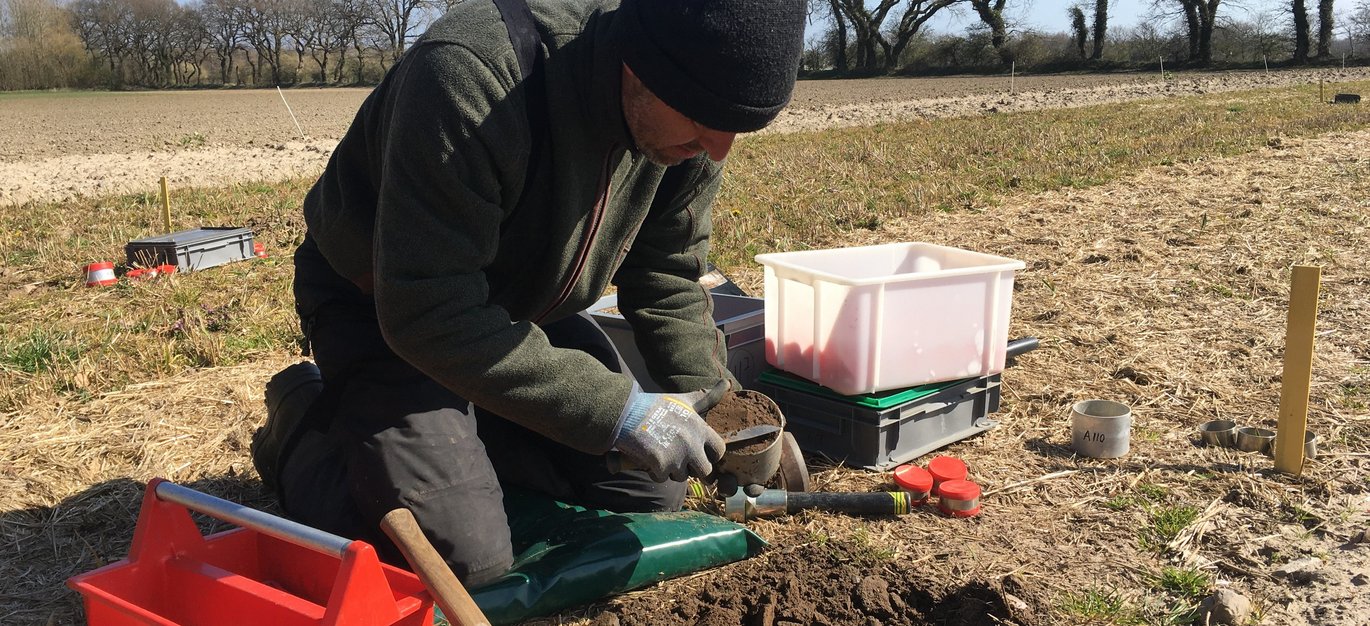New research projects will develop climate smart sustainable management of agricultural soils
Management of agricultural soils is becoming a key aspect in the fight against climate change and its consequences. A new research effort comprising ten trans-European research projects will support the development of climate-smart and sustainable management of agricultural soils.

Soil is the main land based carbon storage. With more carbon stored in the soil there will be less CO2 in the atmosphere and thus reduced climate change. Soil can also be a source of greenhouse gasses, as agricultural practices may result in emissions of nitrous gasses to the atmosphere. Managing agricultural soils to increase carbon storage and reduce greenhouse gas emissions is a true challenge.
Another challenge is to increase the contribution of agricultural soils to climate change mitigation and adaptation, while ensuring that these soils continue to provide the expected ecosystem services, including a sustainable production.
On this background, the EU Commission and 24 member states have established the European Joint Programme EJP SOIL. An important part of the programme is to initiate trans-European research that provide new insights in the possibilities for climate-smart sustainable soil management.
Ten new trans-European research projects on soil
- We are happy to announce the initiation of ten new trans-European research projects on agricultural soils, says Professor Claire Chenu, who coordinates EJP SOIL.
Professor Claire Chenu explains that the new research projects are initiated following a comprehensive roadmap process, identifying key research priorities in the domain of agricultural soil management and relevant for realizing agricultural, climate and environmental policy goals at both regional, national and European level.
The EJP SOIL funded projects will execute research and other joint integrative activities within the research area of climate change mitigation and adaptation, food security, ecosystem services and soil restoration.
Project details
4 research projects on climate change mitigation.
- CarboSeq aims at estimating the feasible SOC-sequestration potential in agricultural soils taking into account technical and economic constraints. The project will align with the current FAO activity for a global SOC-sequestration potential map (GSOCseq).
- SOMMIT focus on Sustainable Management of soil Organic Matter to Mitigate Trade-offs between C sequestration and nitrous oxide, methane and nitrate losses as affected by organic matter additions to soil.
- TRACE-Soils (Mechanisms underlying TRAde-offs between Carbon sequestration, greenhouse gas Emissions and nutrient losses in Soils under conservation agriculture in Europe). The project will identify the mechanisms underpinning trade-offs and synergies of soil carbon sequestration, greenhouse gas emissions and nutrient losses in agricultural soils across Europe, and propose climate-zone specific indicators and measures to mitigate trade-offs in conservation agriculture systems.
- INSURE (Indicators for successful carbon sequestration and greenhouse gas mitigation by rewetting cultivated peat soils) aims at improving understanding of controls of element cycling in rewetted ecosystems and to find robust indicators for the tradeoffs of wet management.
1 synthesis project on climate change adaptation
- CLIMASOMA (CLIMAte change adaptation through SOil and crop MAnagement: synthesis and ways forward) will contribute to an alignment of research strategies connecting agricultural management, soil quality and climate adaptation potential through its summary of the literature, its meta-analysis and its identification of knowledge gaps.
1 research project on landscape analysis – Erosion process
- SCALE (Managing Sediment Connectivity in Agricultural Landscapes for reducing water Erosion impacts) aims to improve the management of sediment connectivity in diverse agricultural landscapes, and will significantly improve the harmonisation of data sets, observation and modelling techniques in connectivity research and bridge the gap between different spatial and administrative scales.
1 stocktake project on innovative soil management practices in Europe and their suitability for European farming systems
- i-SoMPE (Innovative Soil Management Practices). By using a surveying approach, i-SoMPE aims to document innovative soil management practices and agricultural systems that are expected to enhance ecosystem services in order to minimise soil threats and sustain agriculture in a climate change context. The data gathered will be synthesized considering technical and ecological constrains and socio-economic barriers and presented as context- specific thematic maps.
1 stocktake project on ecosystem services assessment
- SIREN (Stocktaking for Agricultural Soil Quality and Ecosystem Services Indicators and their Reference Values). The goal is to make an inventory of indicator systems for assessing soil quality and ecosystem services, as currently used by Member States associated in the EJP SOIL and beyond.
2 research projects on innovative techniques for high-detail mapping soil spatial variation
- STEROPES (Stimulating novel Technologies from Earth Remote Observation to Predict European Soil carbon). The project aim is to overcome the limitations of static soil maps by putting the use of satellite time series forward, test their potential to predict cropland soil organic carbon content over various pedoclimatic conditions and cropping systems across Europe.
- SensRes (Sensor data for downscaling digital soil maps to higher resolutions) The project’s aim is to develop and test a new method, which uses proximal and remote sensors, including drones, satellite images and electromagnetic induction, for downscaling existing soil maps to higher resolutions.
Further information
Further information on the projects and contact information on project coordinators can be found at www.ejpsoil.eu
For further information on EJP SOIL, please contact EJP SOIL coordinator, Professor Claire Chenu at claire.chenu@inrae.fr